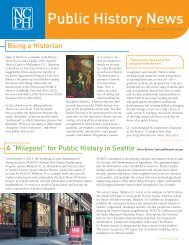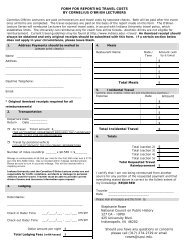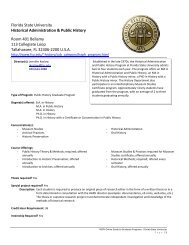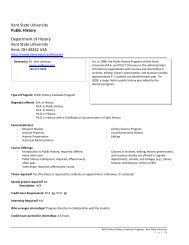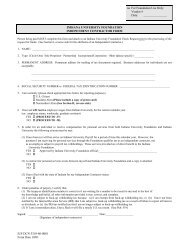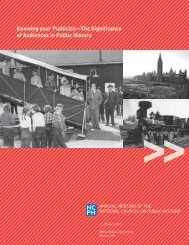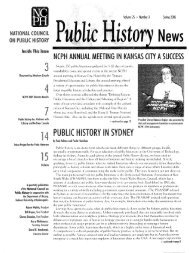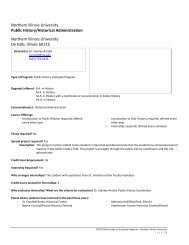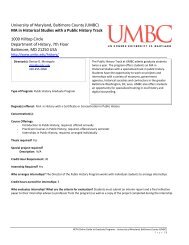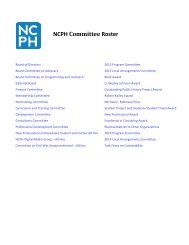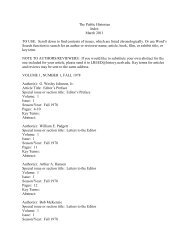Case Statement - National Council on Public History
Case Statement - National Council on Public History
Case Statement - National Council on Public History
Create successful ePaper yourself
Turn your PDF publications into a flip-book with our unique Google optimized e-Paper software.
This last year, however, I significantly changed the semester-l<strong>on</strong>g project into a more<br />
hands-<strong>on</strong> project that ended up being very successful for both the students and our<br />
community. I partnered with our town’s archivist at the public library and together we<br />
came up with a project for creating a walking tour of downtown Amherst drawing <strong>on</strong><br />
materials from the archives. I had a very small class – just four students – so they all<br />
worked together <strong>on</strong> the <strong>on</strong>e project. If I had a larger class, I would have had multiple<br />
projects for teams of three-four students. The city archivist had already created a<br />
w<strong>on</strong>derful site (http://digitalamherst.org) using the Omeka platform. Our first idea was to<br />
simply use this same format and build a new comp<strong>on</strong>ent. However, the students had<br />
become very interested in the applicati<strong>on</strong> of mobile devices during our discussi<strong>on</strong>s and so<br />
we decided to make sure that our project had both a regular Internet comp<strong>on</strong>ent, but also a<br />
Smartph<strong>on</strong>e versi<strong>on</strong>. (http://digitalamherst.org/civilwar). The outcome was quite good – a<br />
walking tour that can be viewed <strong>on</strong> a PC, downloaded as a PDF and MP3 podcast, or used<br />
interactively <strong>on</strong> a smartph<strong>on</strong>e. Not <strong>on</strong>ly did the students learn about implementing such a<br />
digital project – working in Omeka, learning about JQuery and HTML, editing audio files,<br />
etc., but also many very useful public history skills – working with a community partner,<br />
negotiating a final deliverable product, and building something of use for the local<br />
community. Additi<strong>on</strong>ally, my students now have a digital history project that they can add<br />
to their portfolio when they go <strong>on</strong> the job market.<br />
Working with graduate students <strong>on</strong> such a digital public history project took much more of<br />
my time than having each student work individually <strong>on</strong> their own proposals. There was a<br />
lot of just-in-time teaching of programming that I had to do so that they could move <strong>on</strong> to<br />
the next stage in the project. However, I think that each student got more out of the project<br />
and felt a much higher level of success when it was all over.<br />
One idea I would like to discuss is how do we make sure that what we call “digital history”<br />
is not simply digitizing history. I stress this quite a bit in my class in order to push students<br />
to think more creatively about how digital technology might allow us to do something new<br />
and different, rather than simply moving statically from an analogue to a digital platform,<br />
but with not new real added value. To this end, I am c<strong>on</strong>templating a new comp<strong>on</strong>ent or<br />
assignment for the next time I teach the course – hacking history. Each student would need<br />
to take an existing technology and find a new use for it within the realm of digital history.<br />
An example of this might be taking a high resoluti<strong>on</strong> photograph (like those generated by a<br />
GigaPan set up) and applying it not to panoramic vistas, but rather to high-resoluti<strong>on</strong><br />
images of an historic textile so that you can see the decaying of the fibers.<br />
I would love to hear from others what the blend is for you regarding teaching digital<br />
history theory and digital tools or actual programming skills. I have tended to try and push<br />
off the hands-<strong>on</strong> training to the students – either taking workshops sp<strong>on</strong>sored by our IT<br />
department, learning these skills <strong>on</strong> their own through books and tutorials, or by<br />
experimentati<strong>on</strong>. The results, however, have been mixed. Each year I tend to spend more<br />
and more time <strong>on</strong> also teaching some basic skills – HTML and PHP as well as how to work<br />
with WordPress, Omeka, and other off-the-shelf soluti<strong>on</strong>s. I usually say that the minimum<br />
level of understanding they need to master is to be able to speak coherently about their<br />
needs to a programmer. If they can do more than that, great! When our students move into



